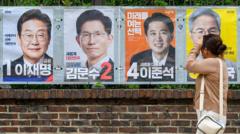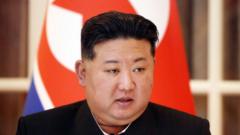South Korea prepares for a presidential election to address the fallout from Yoon Suk Yeol's removal from office due to martial law. Polls indicate a competitive race led by Lee Jae-myung of the Democratic Party and Kim Moon-soo of the People Power Party, as the country navigates political divisions, economic challenges, and complex international relations.
South Korea's Upcoming Presidential Election: A Turning Point After Turmoil

South Korea's Upcoming Presidential Election: A Turning Point After Turmoil
The nation is set to vote in a critical election on June 3rd following the impeachment of former president Yoon Suk Yeol.
South Korea is gearing up for a presidential election on June 3rd, a pivotal moment following the ousting of former president Yoon Suk Yeol. Yoon’s presidency ended abruptly after he declared martial law for six hours in December, leading to his impeachment by parliament and subsequent removal by a constitutional court on April 4. This unprecedented political upheaval has left the nation in turmoil and created an urgent need for stable leadership to navigate the complexities ahead.
The fallout from Yoon's actions is not only political but also economic. His controversial declaration of martial law exposed deep societal divisions between supporters of the conservative People Power Party (PPP) and the opposition Liberal Democratic Party led by Lee Jae-myung. The new president will confront significant challenges, including addressing diminished public confidence in the economy, especially as South Korean goods face tariffs from the United States, creating added pressure on local businesses.
In addition, the incoming leader must manage ongoing North Korean tensions and maintain a delicate balance in foreign relations between the U.S. and China. South Korea is also grappling with one of the world's lowest birth rates, which was recorded at just 0.75 in 2024, far below the replacement level required to sustain its population.
Polls indicate a competitive race, with Lee Jae-myung of the Democratic Party seen as a frontrunner. Lee, a former factory worker turned human rights lawyer, promises a fair society and job growth. Close behind him is Kim Moon-soo of the PPP, who aims to create a business-friendly atmosphere for economic recovery. Other candidates include Lee Jun-seok from the New Reform Party, Kwon Young-guk from the Democratic Labor Party, and two independents. Notably, this election marks the first time in 18 years that there will not be a female candidate.
Voting is set to take place from 06:00 to 20:00 local time on June 3rd, with preliminary results expected shortly after polls close. The newly elected president will assume office immediately without the advantage of a formal transition period from Yoon, who is currently facing charges stemming from his presidential conduct.
In an interesting development, the impeached Yoon Suk Yeol has distanced himself from the PPP and faces an insurrection charge related to his martial law declaration, having briefly been detained earlier this year. As the election approaches, South Korea stands at a critical juncture, needing decisive leadership to heal divisions and tackle pressing issues head-on.



















